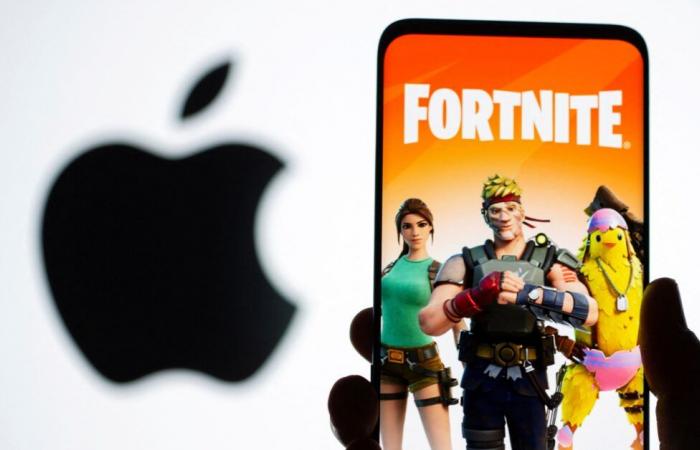
Apple risks an investigation for the court outrage after a US judge said that she had violated an order enjoining her to open her lucrative App Store to more competition and that she had misled the court.
Here is an overview of the current situation and the rest of this resounding case brought by Epic Games, the creator of “Fortnite”.
What declared the judge? On Wednesday, the American federal judge Yvonne Gonzalez Rogers, in Oakland on Wednesday, said that Apple had “deliberately” violated an injunction which she had pronounced in 2021 as part of a antitrust trial brought by Epic Games.
Epic brought legal action in 2020 in order to soften Apple control over transactions in applications that use its iOS operating system and how applications are distributed to consumers. The previous decision of the judge required Apple to give developers more power to orient users of applications to payment options other than those of Apple, who thus avoid the commission of 30 % taken by Apple. Apple failed to convince the Supreme Court of the United States to cancel the injunction, which entered into force in early 2024. The new decision focused on the question of whether Apple had complied with the terms of the injunction.
The judge accused Apple of “disobedience” and said that she had tried to hide her decision -making process from the court.
What should Apple do now?
Gonzalez Rogers said that Apple had to end several practices which, according to her, aimed to bypass her injunction, in particular the new costs of 27 % imposed on application developers when Apple clients buy an application outside the App Store. It has also prohibited the company from using “intimidation screens” to dissuade consumers from using third -party payment options. Apple denied having violated the terms of the court order.
Why did the judge referred the case to a criminal court?
In addition to concluding that Apple had taken measures to bypass her injunction, Ms. Gonzalez Rogers returned Apple and one of her leaders before the federal prosecutors for a possible investigation for criminal outrage.
-“Apple sought to maintain a source of income of several billion dollars in direct violation of the injunction of this court,” she said, saying that internal documents showed that “Apple knew exactly what it was doing” and that a financial official had lied under oath.
Federal judges have the power to ask an investigation organization such as the United States Ministry of Justice to investigate the need to prosecute companies and individuals for violation of a court decision.
Gonzalez Rogers refused to say if the government should initiate prosecution. This decision will return to the federal prosecutor who oversees the teams of the Federal Public Procurement of San Francisco and Oakland.
Companies recognized as guilty of criminal outrage can be sentenced to fines, and individuals can incur imprisonment.
Can Apple appeal?
Yes. Apple said that she did not agree with the court’s decision and that she would ask the 9th Circuit in the United States, based in San Francisco, to re-examine the order.
Apple could ask the court to immediately suspend the decision of Gonzalez Rogers while she continues her appeal. The appeal could be dealt with relatively quickly because most of the complex questions relating to antitrust legislation in this case have already been resolved.
Apple could however come up against a major obstacle, taking into account the many factual elements presented by EPIC before the Court of First Instance. In such circumstances, the courts of appeal tend to be deferential with regard to trial judges.
After the decision of the 9th Court of Appeal, one or the other of the parties may ask the United States Supreme Court to re-examine the decision. (Mike Scarcella report; edited by David Bario and Rod Nickel)





